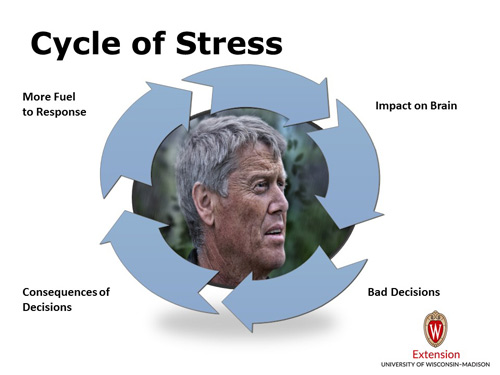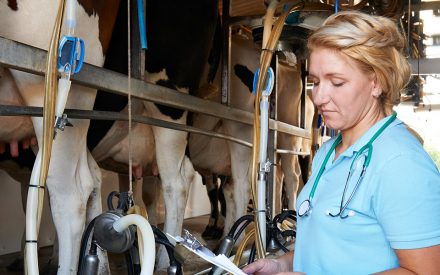Home » Resilient Farms & Families: Responding to Stress » How Stress Affects Brain and Body
How Stress Affects Brain and Body
What’s in this page?
What is stress and how does it affect our brains and bodies?
What influences our capacity for coping with stress?
How does stress influence our decision-making, health and relationships?
More Articles About this Topic
What is stress and how does it affect our brains and bodies?
Stress is our reaction to a threatening event or stimulus. Such events and stimuli are called “stressors.” People perceive and react to stressors differently. Something one person would rate as highly stressful might be rated as considerably less stressful by someone else. These responses are affected by such factors as genetics and life experiences.
Stress can be classified as positive, tolerable or toxic. Toxic stress occurs when we are faced with a continuous stressor or triggered by multiple sources and can have a cumulative toll on our physical and mental health. It is an experience that overwhelms us and leaves us feeling powerless and hopeless.
Video: How Stress Affects Your Brain
When we encounter a stressor, our brain and body respond by triggering a series of chemical reactions that prepare us to engage with or run away from the stressor. Two hormones that we release are adrenaline, which prepares muscles for exertion, and cortisol, which regulates bodily functions. If a stressor is exceptionally frightening, it might cause us to freeze and become incapacitated (Fink, 2010). The stress response triggered by these two hormones causes our:
- Blood pressure to rise
- Heart rate to increase
- Digestive system to slow down (or stop)
- Blood to clot more quickly (Fink, 2010; Donham & Thelin, 2016; Simon & Zieve, 2013)
Thousands of years ago, people who stumbled upon a hungry saber-toothed tiger or other predator would be more likely to survive the encounter if they were able to spring up and sprint away swiftly. An increase in blood pressure and heart rate and a slowdown of digestive processes meant more energy could be directed toward escaping. If they couldn’t run quickly enough, their odds of surviving a wound from the hungry tiger were better if their blood clotted rapidly.
Today, this physical response to stress, if unrelieved, can be damaging to our health. Unrelieved stress is a known risk factor in many of the leading causes of premature death among adults, including conditions and illnesses such as heart disease, hypertension, stroke, type 2 diabetes, and a poorly functioning immune system (Mayo Clinic, 2016). Chronic stress is also a potential risk factor for depression, addiction, and suicide (Donham & Thelin, 2016).
What influences our capacity for coping with stress?
Several factors influence our capacity for coping with stress:
- The presence of a social network (e.g., family, friends, community groups, church)
- Our skill and confidence in assessing a complex situation and then developing and evaluating solutions
- Personal variables such as physical health, experience, confidence, anxiety threshold and problem-solving abilities (Donham & Thelin, 2016).
Stressful events are a universal part of the human experience. You may or may not be able to change your current situation, but you can take steps to manage the impact these events have on you. (see “Stress Management” topic)
How does stress influence our decision-making, health and relationships?
Stress hormones can cloud decision making and even lead to “freezing up” – as well as impacts on relationships, communication, and physical health (heart, diabetes, stroke risk, etc.)
Video: Basics of Farm Stress

All of these outcomes and impacts of short-term stress have been known for decades. But, perhaps the more critical concern is the impact of chronic stress on our ability to think clearly and make good decisions. Stress hormones (cortisol especially) have a negative impact on the part of our brain that we need for:
- Evaluating alternatives and making good business decisions
- Having productive and thoughtful conversations with our family members, community members and others whose help we might need as we move forward during challenging times
These physical health, brain function, and decision making impairments often create a vicious cycle. When we find it difficult to make well-thought-through decisions and to move forward, sometimes this can lead to choices (or conversations) that might have less than desirable outcomes. A poorly contemplated decision (or no decision) can cause even more stress which further fuels this response. This cycle can lead to feelings of hopelessness, anxiety and other concerns, which then in turn may also be connected to depression and the risk of suicide. Fortunately, all these changes that occur under high stress can be managed and reversed, though it takes multiple tactics and strategies to tackle the issue holistically.
Video: Breaking the Cycle of Chronic Farm Stress
More Articles About this Topic
Additional Publication
Farm Stress and Decision Making During Challenging Times — A comprehensive publication covering farm stress and stress management practices related to communication, planning, education, personal health, nutrition, etc. Also contains a top-ten list of important safety-related reminders because of the connection between farm injury and stress. By John Shutske – feel free to print and use in local programs and activities.
Powerpoint Presentation
Chronic Farm Stress: Breaking the Cycle – Presented in March 2019 and American Farm Bureau “Fusion” conference for Young Farmers, Education committees, and other interested producer/leaders. By John Shutske – feel free to use PDF or contact author to use original source materials.
References
- Donham, K. J., & Thelin, A. (2016). Agricultural Medicine: Rural Occupational and Environmental Health, Safety, and Prevention. (2nd ed.). Hoboken, New Jersey: John Wiley & Sons.
- Fink, G. (Ed.). (2019). Stress: Physiology, Biochemistry, and Pathology: Handbook of Stress Series Cambridge, Massachusetts: Academic Press.
- Mayo Clinic Staff (2016). Healthy Lifestyle: Stress management. Mayo Foundation for Medical Education and Research. Retrieved from: http://www.mayoclinic.org/healthy-lifestyle/stress-management/in-depth/stress-symptoms/art-20050987?p=1
- Simon, H. Zieve, D. (2013). Stress. Medical Reference Guide: In-Depth Patient Education Reports. University of Maryland Medical Center.






